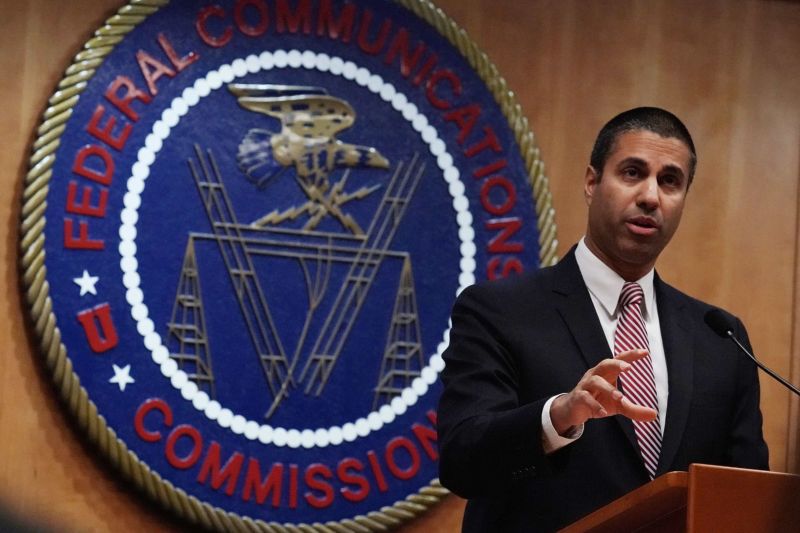https://arstechnica.com/?p=1482785

FCC Chairman Ajit Pai on December 14, 2017, in Washington DC, the day of the FCC’s vote to repeal net neutrality rules.
The Federal Communications Commission has issued $208.4 million in fines against robocallers since 2015, but the commission has collected only $6,790 of that amount. That’s because the FCC lacks authority to enforce the penalties, according to an investigation by The Wall Street Journal.
The Journal learned of the $6,790 figure by making a Freedom of Information Act request. “An FCC spokesman said his agency lacks the authority to enforce the forfeiture orders it issues and has passed all unpaid penalties to the Justice Department, which has the power to collect the fines,” the Journal report said. “Many of the spoofers and robocallers the agency tries to punish are individuals and small operations, [the spokesman] added, which means they are at times unable to pay the full penalties.”
The Justice Department declined to comment.
Since Ajit Pai became FCC chairman in January 2017, the FCC has issued $202 million in forfeiture orders against robocallers but has collected none of it, the Journal wrote. That includes a $120 million penalty issued in May 2018 against a robocaller that was accused of making 96 million robocalls during a three-month period in order to trick people into buying vacation packages.
Separately, the Federal Trade Commission has collected $121 million out of $1.5 billion worth of penalties issued against robocallers since 2004, the Journal report said. An FTC spokesperson told the Journal that it is proud of its 8 percent collection rate.
“The dearth of financial penalties collected by the US government for violations of telemarketing and auto-dialing rules shows the limits the sister regulators [FCC and FTC] face in putting a stop to illegal robocalls,” the Journal wrote. “It also shows why the threat of large fines can fail to deter bad actors.” Fines can be “a deterrent on legitimate companies that have real assets in the US,” but they aren’t as effective against scammers and overseas operators, an attorney quoted by the Journal said.
Paid FCC fines are deposited into the US Treasury. In some cases, the FCC settles with offenders, and such settlements can include refunds for consumers or compliance requirements.
The FCC’s enforcement process begins with the issuance of a proposed fine. This first formal step “informs the company of the alleged unlawful activity, establishes the maximum penalty that could be assessed for that violation, and provides the company with an opportunity to contest the allegations,” the FCC says.
The FCC’s best bet for collecting is often settling with the violator for some amount lower than the proposed fine. If there is no settlement, the FCC can issue the aforementioned forfeiture orders and hope that the violators pay up. The $208.4 million figure in the Journal story consists of “forfeiture orders in cases involving robocalling, Do Not Call Registry, and telephone solicitation violations,” the Journal wrote.
FTC shuts down robocallers
The FTC has more authority than the FCC to require refunds for consumers and shut down robocalling operations. On Tuesday this week, the FTC announced court settlements with “four separate operations responsible for bombarding consumers nationwide with billions of unwanted and illegal robocalls pitching auto warranties, debt-relief services, home security systems, fake charities, and Google search results services.”
Under these new settlements, “the defendants are banned from robocalling and most telemarketing activities, including those using an automatic dialer, and will pay significant financial judgments,” the FTC said.
But the FTC will just collect parts of those judgments. For example, one of the settlements imposed fines totaling $5.5 million against a defendant and his companies. But the fines will be suspended once the defendant pays $18,000.
Americans receive tens of billions of robocalls each year, according to estimates cited by the FCC. Pai has repeatedly talked tough on robocallers, for example by urging carriers to adopt stronger anti-robocall technologies.
FCC Commissioner Jessica Rosenworcel, one of two Democrats on the Republican-controlled commission, wants stronger action.
“I’ve called for carriers to make free tools to block robocalls available to every consumer,” she wrote on Twitter today. She also criticizing the FCC’s poor record in collecting fines: “It’s time for my colleagues [to] join me in this effort.”
The lack of follow-through on big fines isn’t new to Pai’s FCC. The FCC in 2015 proposed a fine of $100 million against AT&T for throttling the wireless Internet connections of customers with unlimited data plans without adequately notifying the customers about the reduced speeds. But AT&T fought the proposed penalty, and the FCC apparently never issued a forfeiture order in that case.
via Ars Technica https://arstechnica.com
March 28, 2019 at 04:21PM
